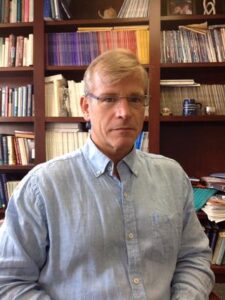The Child Study Center’s Lois Bloom Lecture is made possible by a gift from Dr. Lois Masket Bloom, ’56 Arts and Letters and a Distinguished Alumna of Penn State (d. 2025), and Edward Lee Thorndike Professor Emeritus, Teachers College, Columbia University. This lectureship fund supports lectures by outstanding experts in the field of child studies with a special emphasis on early child development.

Adriana J. Umaña-Taylor, Ph.D.
Sara Lawrence-Lightfoot Professor of Education
Harvard University Graduate School of Education

Adriana J. Umaña-Taylor, Ph.D.
Sara Lawrence-Lightfoot Professor of Education
Harvard University Graduate School of Education
Abstract: In societies where the social constructs of race and ethnicity are used to inform and justify a hierarchical structure of power and access to resources, ethnic-racial identity formation becomes an important developmental competency to understand and foster in young people. Furthermore, the developmental period of adolescence provides a unique context within which to understand how age-graded and socio-culturally informed contingencies interact to shape young people’s development. This presentation will explore how school-based interventions such as the Identity Project can promote adolescents’ ethnic-racial identity development and, in turn, their psychosocial adjustment. Findings will be shared from a series of investigations that (a) tested the efficacy of the Identity Project curriculum, (b) examined changes in adolescents’ ethnic-racial identity when their teachers implemented the Identity Project, (c) tested the feasibility of training educators to deliver the curriculum with fidelity, and (d) explored changes in high school teachers’ culturally sustaining pedagogical practices after training for and implementing the Identity Project. Finally, emerging research on the cross-cultural adaptation of the Identity Project will be presented, with attention to how this work may contribute to building a more global developmental science.
Thursday, October 2, 2025
The 2025-2026 Child Study Center’s Lois Bloom Lecture
4:15 p.m., Nittany Lion Inn, Ballroom A/B
Light reception to follow

Catherine Tamis-LeMonda, Ph.D.
Professor of Applied Psychology
NYU Steinhardt

Catherine Tamis-LeMonda, Ph.D.
Professor of Applied Psychology
NYU Steinhardt
Abstract: Infancy is a remarkable time. Each emerging skill generates perceptual and social feedback vital to learning. And although researchers of infancy each zero in on a specific domain of development, our work is grounded in core principles of learning. In this talk, Tamis-LaMonda spotlights fundamental tenets of developmental science and the need for researchers to surmount soundbites, theoretical divides, methodological assumptions, and the narrow approaches to culture that persist in the field. Tamis-LeMonda illustrates with examples of infant-parent everyday home activities in samples from different socioeconomic status households, language communities, and global sites. She shows that infant learning is the product of immense amounts of time-distributed, varied practice; that cognition is grounded in action; and that venturing beyond the lab and expanding inquiry to diverse cultural communities offers unique insights into learning processes.
Thursday, October 10, 2024
The 2024-2025 Child Study Center’s Lois Bloom Lecture
4:15 p.m., Memorial Lounge, 107 Pasquerilla Spiritual Center
Light reception to follow

Joseph P. Allen, Ph.D.
Hugh P. Kelly Distinguished Professorship in Arts & Sciences, Psychology
University of Virginia

Joseph P. Allen, Ph.D.
Hugh P. Kelly Distinguished Professorship in Arts & Sciences, Psychology
University of Virginia
Abstract: The adult world is deeply ambivalent about adolescent social relationships. We fear the power and effects of peer influence and worry about the impact of social media. Yet, our youth are remarkably lonely and have only grown more so over the past 15 years. This talk will address this ambivalence and make the case that forming strong bonds with peers is the key social developmental task of adolescence, with a surprising range of lifelong implications. The talk will then go on to describe a unique intervention, The Connection Project, designed to address youths’ growing need for (and difficulty establishing) the deep peer relationships needed to support their growth and development. Promising data from randomized trials will be presented, along with discussion of the issues involved in scaling successful interventions for youth.
Thursday, November 30, 2023
The 2023-2024 Child Study Center’s Lois Bloom Lecture
3:30 p.m., Memorial Lounge, 107 Pasquerilla Spiritual Center
Light reception to follow

Cynthia García Coll, Ph.D.
Charles Pitts Robinson and John Palmer Barstow Professor Emerita, Brown University
Adjunct Professor, Department of Pediatrics, University of Puerto Rico

Cynthia García Coll, Ph.D.
Charles Pitts Robinson and John Palmer Barstow Professor Emerita, Brown University
Adjunct Professor, Department of Pediatrics, University of Puerto Rico
“Perspectives in the Study of ‘Minoritized’ Children and Families: The Need for a Paradigm Shift”
Abstract: Historically, both theoretically and empirically, “minoritized” children and families have been predominantly studied from deficit perspectives. More recent theoretical frameworks identify shortcomings in our prevalent theories, constructs, and empirical approaches to these populations. A paradigm shift is needed that will start by examining critically our graduate training, our prevalent research methods, and our mechanisms for funding and publishing.
Thursday, September 29, 2022
The 2022-2023 Child Study Center’s Lois Bloom Lecture
4:45 p.m., Location: 127 Moore Building
Registration required
Light reception to follow

Helen Egger, MD
Co-Founder and Chief Medical & Scientific Officer
Little Otter

Helen Egger, MD
Co-Founder and Chief Medical & Scientific Officer
Little Otter
“Seeing the Lion: From Epidemiology to Digital Health in Search of Transformative Change in Early Childhood Mental Health”
Abstract: In this lecture, Dr. Egger will review her work in the science and practice of early childhood mental health during each of the decades of her thirty year career. From jokes early in her career that early childhood mental health involved “putting babies on couches” to advances in the nosology and methods for multi-modal assessment to application of machine learning and computer vision analytics to longitudinal data and video data to the decision to leave academia to co-found a venture-backed digital health start-up–Dr. Egger will bring this journey to the present where she will highlight current opportunities to continue to advance early childhood developmental psychopathology and to translate science into tools and care models that can scale and meet the needs of young children and their families.
Thursday, September 16, 2021
The 2021-2022 Child Study Center’s Lois Bloom Lecture
4:15 p.m./Presented via Zoom
Registration required

Nancy E. Hill, Ph.D.
Charles Bigelow Professor of Education
Graduate School of Education
Harvard

Nancy E. Hill, Ph.D.
Charles Bigelow Professor of Education
Graduate School of Education
Harvard
“The End of Adolescence: Purpose, Insecurity, and Indecision on the Pathway to Adulthood”
Abstract: Even as youth often live ‘in the moment,’ adolescence is a time of preparation and transition. Youth are figuring out what they need from their adolescent years and from schools to be prepared for adulthood. In addition to academic preparation, youth need a broad set of skills and dispositions to navigate a complex and global economy. Whereas it is important to help youth envision themselves in careers and in college, focusing on college and careers as outcomes often misses the importance of helping youth hone their sense of purpose and develop the cognitive and analytical skills to make sense of and navigate the job market. Professor Hill will present research on the significance of these broader outcomes and the relational supports that are associated with their development. As there are entrenched inequities in access to high quality education, to college, and to the social capital needed to navigate a successful transition to adulthood, these processes are examined in a series of studies on diverse samples. By examining findings across samples from a range in economic and ethnic backgrounds, commonalities and divergences in goals and experiences will be highlighted. Further, as these studies are grounded in research-practice partnerships, the integration of findings across theory, policy and practice will be emphasized.
Thursday, September 17, 2020
The 2020-2021 Child Study Center’s Lois Bloom Lecture
4:15 p.m., Virtual

Mary Dozier, Ph.D.
Professor of Psychology and Unidel Amy Elizabeth du Pont Chair in Child Development
Director of Clinical Training
University of Delaware

Mary Dozier, Ph.D.
Professor of Psychology and Unidel Amy Elizabeth du Pont Chair in Child Development
Director of Clinical Training
University of Delaware
“Early Adversity and Intervention: Effects Over Time”
Abstract: Dr. Dozier will consider the effects of different types of early adversity on children’s functioning, and factors that affect children’s ability to recover behaviorally and biologically following adversity. The types of adversity considered will include parental neglect, maternal opioid dependence, foster care, and orphanage care. An intervention, Attachment and Biobehavioral Catch-up (ABC), has been developed and adapted for parents of young children who have experienced these various forms of adversity. Recent findings from our randomized clinical studies will be presented, highlighting brain and behavioral outcomes from middle childhood.
Thursday, September 20, 2018
The 2018 Child Study Center’s Lois Bloom Lecture
4:15 p.m., Nittany Lion Inn, Assembly Room

Thomas G. O'Connor, Ph.D.
Professor, Department of Psychiatry
Director, Wynne Center for Family Research
University of Rochester Medical Center

Thomas G. O'Connor, Ph.D.
Professor, Department of Psychiatry
Director, Wynne Center for Family Research
University of Rochester Medical Center
Abstract: There is now a great deal of clinical and theoretical regard for the role that early stress may play in long-term behavioral and physical health outcomes. This area of research encompasses many broad and substantial models of human development (e.g., “developmental programming”), engages several competing and complementary biological mechanisms (e.g., stress physiology, [neuro]inflammation), and requires an impressive array of research techniques (e.g., neuroimaging, behavioral manipulations). In the course of this presentation, we will consider some of these, and focus particularly on the goodness of fit between alternative models and available evidence. We will also consider how a trans-disciplinary approach, which is needed for this kind of study, presents practical challenges for research and training.
Thursday, September 21, 2017
The Child Study Center’s 2017 Lois Bloom Lecture
4:15 p.m., The Nittany Lion Inn

Velma McBride Murry, Ph.D.
Lois Autrey Betts Chair, Education and Human Development
Joe B. Wyatt Distinguished University Professor
Professor, Human & Organizational Development in Peabody College
Vanderbilt University

Velma McBride Murry, Ph.D.
Lois Autrey Betts Chair, Education and Human Development
Joe B. Wyatt Distinguished University Professor
Professor, Human & Organizational Development in Peabody College
Vanderbilt University
“Scaling up Evidence-Based Programs in Community Settings: Opportunities and Challenges”
Abstract: A plethora of empirically supported preventive interventions have been shown to avert and improve outcomes for children, youth, and families. Yet, evidence-based programs and practices (EBPs) often do not lead to large-scale and successful program implementation in real world settings. Advancing the impact of effective prevention programs requires addressing fundamental questions about novel ways that communities can adopt, adapt to their own cultural values, and subsequently own and deliver an EBP intervention with fidelity and sustainability. This presentation will address challenges and opportunities for scaling up EBP in community settings, demonstrating the potential widespread implementation and sustainability of technology as an effective program delivery platform.
Thursday, September 22, 2016
The Child Study Center’s 2016 Lois Bloom Lecture
4:15 p.m., The Nittany Lion Inn, Assembly Room

Laurence Steinberg, Ph.D.
Distinguished University Professor
Laura H. Carnell Professor of Psychology
Temple University

Laurence Steinberg, Ph.D.
Distinguished University Professor
Laura H. Carnell Professor of Psychology
Temple University
“Age of Opportunity: Lessons From the New Science of Adolescence”
Abstract: Adolescence now lasts longer than ever, and the adolescent brain is surprisingly malleable. These new discoveries make this time of life crucial in determining a person’s ultimate success and happiness. In this lecture, Laurence Steinberg will discuss the teenage brain’s potential for change, the links between brain development and risk-taking in adolescence, the elongation of adolescence as a developmental stage, and the implications of each for how we parent, educate, and understand young people.
Tuesday, September 22, 2015
The Child Study Center’s 2015 Lois Bloom Lecture
4:15 p.m., The Nittany Lion Inn, Assembly Room

BJ Casey, Ph.D.
Director of Sackler Institute for Developmental Psychobiology
Professor of Developmental Psychobiology
Weill Medical College of Cornell University

BJ Casey, Ph.D.
Director of Sackler Institute for Developmental Psychobiology
Professor of Developmental Psychobiology
Weill Medical College of Cornell University
“Easy to Remember, Difficult to Forget: The Development of Fear Regulation”
Abstract: Fear extinction learning is a highly adaptive process that involves the integrity of frontolimbic circuitry. Its disruption has been associated with emotional dysregulation in stress and anxiety disorders. This presentation will examine how age, genetics and experiences shape our capacity to regulate fear in cross-species studies. Evidence for adolescent-specific diminished fear extinction learning will be presented in the context of immature frontolimbic circuitry. Evidence for less neural plasticity in fear regulation as a function of early life stress and genotype also will be presented. Finally, this work will be discussed in the context of exposure-based behavioral therapies for the treatment of anxiety and stress disorders, speculating on how such therapies may be optimized for the individual based on the patient’s age, genetic profile and personal history to move from standard treatment of care to personalized and precision medicine.
Wednesday, October 15, 2014
The Child Study Center’s 2014 Lois Bloom Lecture
4:15 p.m., The Nittany Lion Inn, Boardroom

Nathan A. Fox, Ph.D.
Distinguished University Professor and Chair
Department of Human Development and Quantitative Methodology
University of Maryland

Nathan A. Fox, Ph.D.
Distinguished University Professor and Chair
Department of Human Development and Quantitative Methodology
University of Maryland
Abstract: Developmental psychologists and educators assume that early experiences shape the brain and neural circuitry for emerging cognitive and social behaviors over the first years of life. Most of the evidence for these assumptions is based on rodent and non-human primate animal research. Far less has been published on the effects of early experience that is not correlational in nature. The Bucharest Early Intervention Project (BEIP) is the first randomized trial of a family intervention for children who experienced significant psychosocial neglect early in their lives. A group of infants living in institutions in Romania were recruited and randomized to be taken out of the institution and placed into family/foster care homes or to remain in the institution. Follow up of these children occurred at 42 and 54 months of age and at 8 years of age. Multiple domains, including cognitive, socio-emotional, psychiatric, and brain imaging were assessed at each age. Three questions are posed in this study and this talk: first, are there lasting effects of early psychosocial deprivation as children develop over the school years. Second, is intervention successful in ameliorating deficits as a result of institutionalization. And third, are there sensitive periods in delivering the intervention that explain both success and failure to improve cognitive and socio-emotional behavior.
Thursday, January 16, 2014
The Child Study Center’s 2013 Lois Bloom Lecture
4:15 p.m., Nittany Lion Inn, Ballroom A&B
Seth Pollak, Ph.D.
Distinguished Professor of Psychology
University of Wisconsin at Madison
Seth Pollak, Ph.D.
Distinguished Professor of Psychology
University of Wisconsin at Madison
September 13, 2012
The Child Study Center’s 2012 Lois Bloom Lecture
Megan Gunnar, Ph.D.
Professor of Child Development and Principal Investigator for The International Adoption Project
Co-Principal Investigator of The Early Experience, Stress Neurobiology, and Prevention Science Network
University of Minnesota
Megan Gunnar, Ph.D.
Professor of Child Development and Principal Investigator for The International Adoption Project
Co-Principal Investigator of The Early Experience, Stress Neurobiology, and Prevention Science Network
University of Minnesota
November 10, 2011
The Child Study Center’s 2011 Lois Bloom Lecture
W. Thomas Boyce, M.D.
Professor, Sunny Hill Health Centre/BC Leadership Chair in Child Development
College for Interdisciplinary Studies and Faculty of Medicine
University of British Columbia
W. Thomas Boyce, M.D.
Professor, Sunny Hill Health Centre/BC Leadership Chair in Child Development
College for Interdisciplinary Studies and Faculty of Medicine
University of British Columbia
September 23, 2010
The Child Study Center’s 2010 Lois Bloom Lecture
Joel T. Nigg, Ph.D.
Professor, Departments of Psychiatry, Pediatrics, Behavioral Neuroscience & Genetics
Director, Division of Psychology, Department of Psychiatry, Oregon Health & Science University
Joel T. Nigg, Ph.D.
Professor, Departments of Psychiatry, Pediatrics, Behavioral Neuroscience & Genetics
Director, Division of Psychology, Department of Psychiatry, Oregon Health & Science University
October 8, 2009
The Child Study Center’s 2009 Lois Bloom Lecture
Daniel S. Pine, M.D.
Chief, Section on Developmental and Affective Neuroscience
Chief, Child and Adolescent Research in the Mood and Anxiety Disorders Program
National Institute of Mental Health, Division of Intramural Research Programs
September 18, 2008
The Child Study Center’s 2008 Lois Bloom Lecture
Robert Marvin, Ph.D.
Associate Professor, University of Virginia Health System
Department of Psychiatric Medicine, Child and Family Psychiatry
September 20, 2007
The Child Study Center’s 2007 Lois Bloom Lecture
Richard Davidson, Ph.D.
Professor of Psychology
University of Wisconsin, Waisman Center
September 21, 2006
The Child Study Center’s 2006 Lois Bloom Lecture
Joseph Campos, Ph.D.
Professor of Psychology
University of California, Berkeley
September 22, 2005
The Child Study Center’s 2005 Lois Bloom Lecture
Russell A. Barkley, Ph.D.
Professor, College of Health Professions
Medical University of South Carolina (MUSC)
April 8, 2004
The Child Study Center’s 2004 Lois Bloom Lecture
Dante Cicchetti, Ph.D.
Director, Mount Hope Family Center
University of Rochester
May 8, 2003
The Child Study Center’s 2003 Lois Bloom Lecture
Marc Bornstein, Ph.D.
National Institute of Child Health and Human Development
May 2, 2002
The Child Study Center’s 2002 Lois Bloom Lecture
Margaret Beale Spencer, Ph.D.
Department of Psychology
University of Pennsylvania
Margaret Beale Spencer, Ph.D.Department of PsychologyUniversity of Pennsylvania
May 9, 2001
The Child Study Center’s 2001 Lois Bloom Lecture
Judy DeLoache, Ph.D.
University of Illinois
April 27,2000
The Child Study Center’s 2000 Lois Bloom Lecture